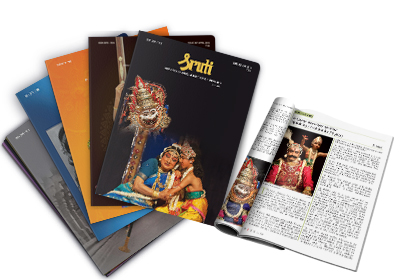Season potpourri - II - Some of the lecdems at the Music Academy by Revati
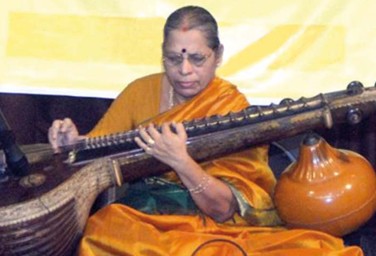
The trail of Begada Dr. R.S. Jayalakshmi, a noted vainika, presented a lecture demonstration on the raga Begada. It was a lucid presentation in which facts were laid down on the basis of authentic textual references on the one hand and authoritative practical demonstration on the other. Taking the Sangeeta Sampradaya Pradarsini as the source text for explaining the structure and form of the raga, she said the book had a record of Begada as it evolved through three centuries, from the 17th to 19th. She pointed out that ni and ma were the notes that lent Begada its uniqueness. The various changes in prayoga-s – both additions and deletions, with respect to the geetam, Muthuswami Dikshitar’s kriti-s and Subbarama Dikshitar’s sanchari-s were explained with suitable demonstration. In spite of such structural changes, interestingly, the form and feel of the raga were not altered. Citing Tyagaraja kriti-s and the compositions of later composers, she observed that there has a been a marked shift from sparse usage of the kaisiki nishada (only in pa dha ni, dha pa) in SSP to its abundance in present day renditions of Begada, while the kakali nishada has taken a backseat. She also spoke about the changes made by later vidwans to the popular Begada varnam Inta chalamu which has resulted in some of the prayoga-s like ‘sa ni dha ni sa’ being lost or considered outdated. The lecture was received well and vidwan Chengalpet Ranganathan and other veterans complimented her. It clearly showed the clarity and accuracy of a true scholar.
TALKING THEATRE - A paradigm of the universe by Indira Parthasarathy
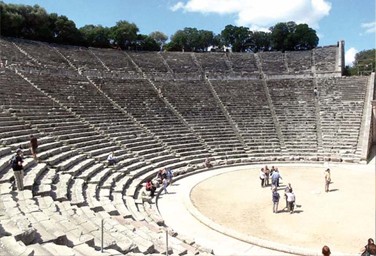
Theatre at its best has a fascination, a power, and a distinctive human splendour which can make other fine arts seem cold and remote. Nothing else has quite the same ability to erase the distinction between art and life. We have heard the bards proclaim that all the world is a stage and not a symphony, a poem, a painting or even a novel. It is a powerful and vibrant art form for moulding the mind. It comes fully alive in the intellectually charged energy generated between the stage and the audience. Historically, it is seen as signifying a high point in the cultural development of a people, and has been a measure of its accomplish-ment. It is one of the most democratic forms of creative expression, for it can only be sustained by the will and acceptance of the public. Now it may be a valid question to ask: Who goes to the theatre in our age of cinema, television, sport and discos? In India, during the ancient period, the educated as well as the masses went to the theatre, as one understands from the two classifications ‘rajadharmi’ and ‘lokadharmi’ mentioned in old dramatic manuals in Sanskrit and Tamil (in Tamil it was ‘vediyal’ and ‘poduvial’).
News & Notes - SNA Fellowships and Awards 2010
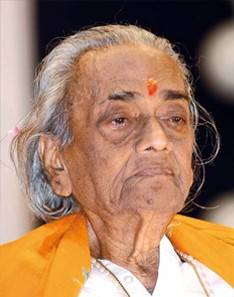
The General Council of the Sangeet Natak Akademi, elected two eminent personalities in the field of the performing arts – Girija Devi and Nataraj Ramakrishna as Sangeet Natak Akademi Fellows (Akademi Ratna). The Fellowship of the Akademi is a prestigious and rare honour restricted to a limited number at any given time, with 34 Fellows so far. Thirty-eight persons (nine in music, nine in dance, and eighteen in theatre and puppetry) were selected to receive the Sangeet Natak Akademi Awards (Akademi Puraskar) for the year 2010. The Fellowship has been conferred from the year 1954 and now comprises a purse of three lakh rupees. The Akademi award was instituted in 1952, and carries a purse of one lakh rupees. Ashok D. Ranade will be honoured with the Akademi Award for Scholarship in Performing Arts (music) and Jaidev Taneja for Overall Contribution to Performing Arts (theatre). The following is a list of Akademi Fellows and Akademi awardees for 2010.
NEWS & NOTES - Tyagaraja aradhana by Manna Srinivasan
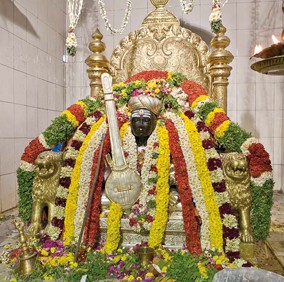
Tiruvaiyaru calling Come ‘Bahula Panchami’ in January, and it is Tyagaraja aradhana time at Tiruvaiyaru. The unique and enduring appeal of this annual event at the bard’s samadhi on the banks of the sacred Kaveri, has to be experienced to be believed. The fertile and hallowed spot in the ‘Chola’ country about which Tyagaraja makes an eulogistic reference in the kriti, Muripemu galigegada in Mukhari. E mahilo sogasaina chola seemayandu varamaina Panchnadapura, is the destination attracting devoted aficionados of Carnatic music from various places. (Already glorified by the legend of the Tevaram saint Appar, has acquired additional fame through Tyagaraja’s association.) In recent times, the appreciation for Tyagaraja’s multifaceted contribution to music in a larger perspective and the intention to pay him homage, have become widespread. A succinct assessment of Tyagaraja’s music makes a powerful statement: “Telugu in lyrical form, Tamil in tradition, Carnatic in grammar, Indian in vision and human in spirit.” (Sonti Ramamurthy)

